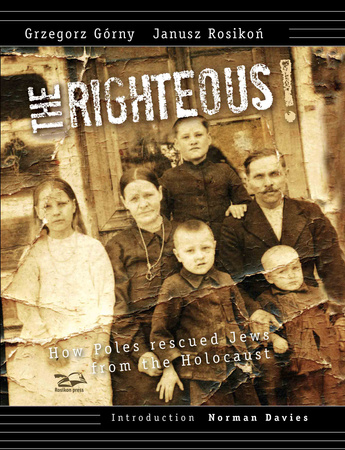The Righteous!
- How Poles rescued Jews from the Holocaust
The book "Righteous" tells the story of Poles rescuing Jews during the Nazi occupation of Poland, many of whom paid the highest price for their actions (like the families of the Ulms, Kowalskis and Barankowie, for example). At least ten Poles in the know were needed to save one escapee from the ghetto, writes the author. Hanna Krall remembers a network of 42 people of good will who were involved in saving her life as a young girl. Thus, conspiring in defense of the Jews was a much wider phenomenon than is usually assumed.
This richly illustrated volume shows the political and social context of Nazi genocide. The phenomenon of saving Jews is presented in a broader historical perspective as well as through individual histories. Based on material from the archives, the volume is a rich collection of facts, textual and documentary, describing the situation of the Polish and Jewish populations under Nazi occupation, and their mutual relations. It also presents the attitude toward the Holocaust of the Polish Underground State, the conspiratorial groups, the Roman-Catholic Church and different social groups. It reports on the actions to save Jews, both individual and institutional (e.g., the Żegota organization). Witnesses to history who appear in the pages of this book include, among others, Władysław Bartoszewski, Marek Edelman, Irena Sendler and Shewach Weiss.
The volume is a tribute and does justice to the heroes of a difficult age. It asserts a historical truth even as it deals with false stereotypes common in some circles abroad regarding the attitude presented by Poles in general during World War II (nation of antisemites, blackmailers and looters).
Excerpt from the Introduction by Norman Davies
Other wartime topics still await a proper airing. One of them is the moving story of the heroic Poles who set out to rescue Jews against all the odds. No nation is made up exclusively of heroes, and the Polish nation is no exception, though it seems to have produced its fair share. No history of the Second World War can be complete without an explanation of the Zegota organisation, of individuals like Irena Sendler or of the Catholic nuns, who took in Jewish children. Elementary justice demands that they are duly honoured and remembered, not because they were Poles, but simply because they did their duty as Christians and compassionate human beings.
Nor should we make the mistake of thinking that the names recorded at Yad Vashem provide the final reckoning. The Israeli authorities can only honour the names which have been reported to them and which have passed a stringent test of verification. Many others must have played a part about which we know nothing: people who sheltered a Jewish family for only two or three days, even though the danger was at its height: people who were killed in retribution by the Nazis together with their Jewish guests, leaving no trace: and people, who did their duty during the war and then kept their silence. So here is another distinction. There are "righteous Poles", who are known to Yad Vashem, and others whose names are known only to God.
Add to shopping cart for the English edition
https://issuu.com/rosikonpress/docs/dowody_tajemnicy_issuu

